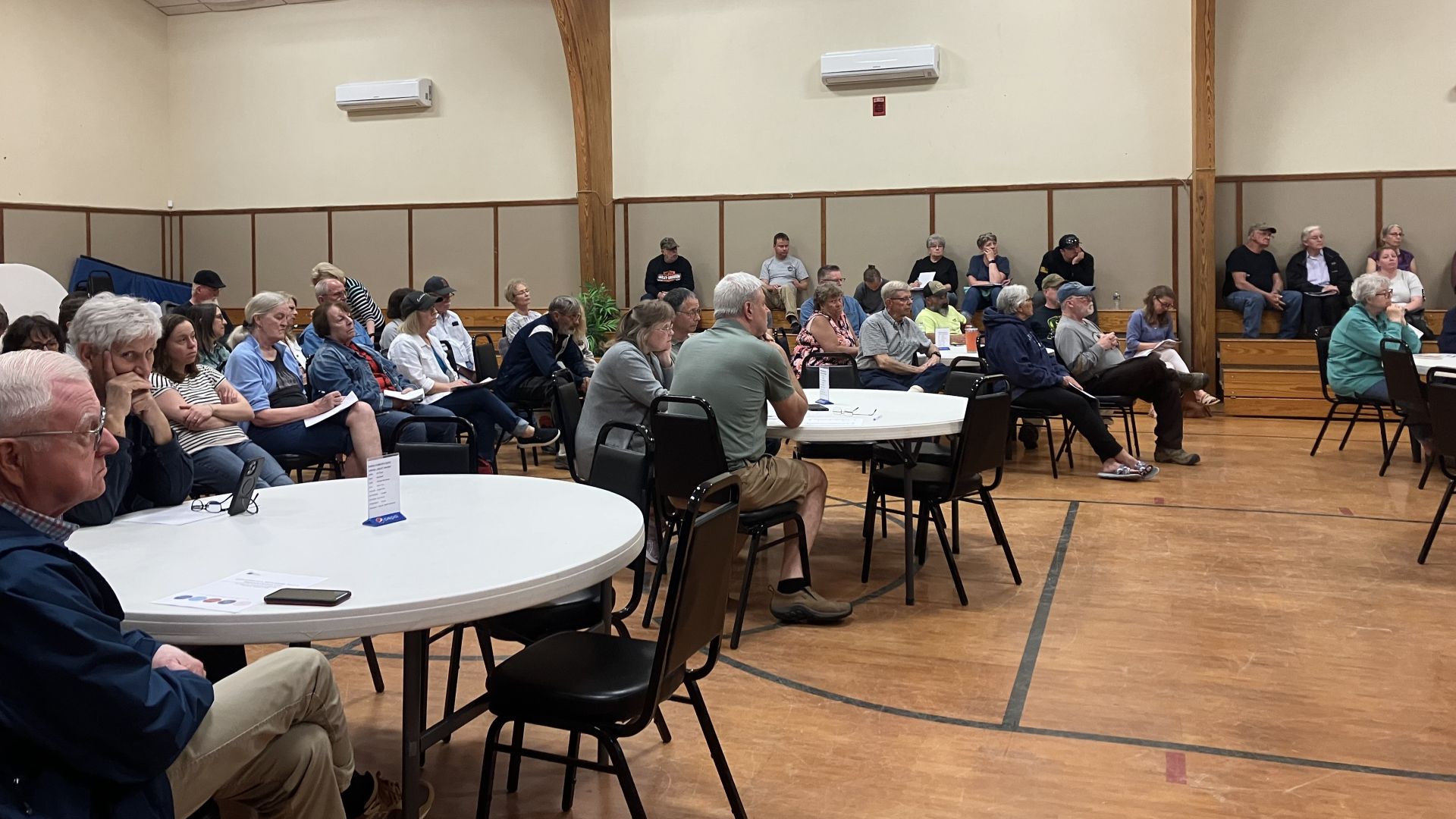The Carrabassett River, a tributary of the Kennebec, rushes over the North Anson Gorge Falls.
Just up the road, Regional School Unit 74 Superintendent Mark Campbell shuffled papers on his desk, pointing out colorful bass fishing lures that students had made for him. He described the school district, which serves the Somerset County towns of Anson, Embden, New Portland, and Solon, as a “close-knit family.”

“We look out for each other,” Campbell said. “And as a result of that, the communities have always stood behind their schools.”
But that could change.
On Thursday, around 50 residents gathered at Embden’s community center to discuss a proposal to leave the school district.
“We’re sitting in a gymnasium that used to be part of an elementary school that unfortunately closed, in part because we don’t have a student population here anymore,” said Patricia Cobb, a member of the withdrawal exploratory committee that Embden formed earlier this year.
Embden, which contributes nearly a third of the local share of the school district’s budget, is home to less than a fifth of the district’s students. This spring, residents started circulating a petition to explore what it would look like to leave the district, citing concerns about rising costs and arguing that declining enrollment is at odds with school budget increases.
RSU 74 has a $12.9 million budget on the table — about a $350,000 increase from last year. If Embden were to undertake the complex, 22-step process to withdraw and decide to go through with it, Campbell said, the district’s four schools would take a big hit.

The proposal has sparked controversy and tension among neighbors.
Those in favor of withdrawing say that rising costs make continuing to fund a significant portion of the district’s budget unsustainable, and they see a need to relieve the town’s tax burden. Those against the proposal worry about the impact withdrawal would have on the schools and their students, and are wary of spending thousands on legal fees and other costs associated with the process — particularly since the town pursued withdrawal a decade ago and was unsuccessful.
On Thursday, most residents at the public hearing appeared to be against the idea.
Embden is not the only town considering withdrawal in the region: nearby Strong and Phillips recently voted to establish formal committees and begin exploring an exit from their district, MSAD 58, which lost the town of Eustis in 2013. Another district in the area, MSAD 59, or Madison Public Schools, lost three towns — Starks, Athens and Brighton Plantation — between 2012 and 2013.
These withdrawals fit into a longstanding debate over the size and nature of Maine’s school districts, and follow a statewide consolidation push in 2007 that generated significant controversy.
They also come at a time when property values, and thus taxes, are spiking in towns across Maine, and when growing education costs are prompting cries to reassess how the state and local towns should divide responsibility for funding public schools.
A changing landscape
Embden, which has around 940 year-round residents and around 90 students in RSU 74, is situated around a series of ponds — the largest of which is the town’s namesake.
The town is neither the wealthiest nor the largest in the district, per census data, but its waterfront property means it has the highest property valuation, which has more than doubled since 2015.
The state’s Essential Program and Services formula, which sets the minimum cost for education in each school district, uses property values to determine a town’s share of the costs. In RSU 74, the state requires Embden to contribute the most out of the minimum school budget — 34 percent.
However, towns often feel the need to raise additional funds — known as “additional local” — to cover programs and expenses not sufficiently funded through the EPS formula. With the additional local funds factored in, Anson is the highest local contributor.
State data shows that Maine will contribute around $4.6 million in the 2026 school year, or 54 percent required by the EPS budget for RSU 74. The formula requires towns in the school district to raise about $3.8 million, and the district says it needs about $3.5 million in additional local funds.
The district has four schools: a high school and middle school in North Anson, and two elementary schools in Anson and Solon. The district had 575 students this school year, down from 663 in the 2015-16 school year, according to state data. The district has 152 employees, 20 of whom live in Embden, according to Campbell.
Five-year data from the school district shows that Embden’s enrollment has increased from 83 to 90 students since the 2020-21 school year.

Two of the district’s schools have closed in the past 50 years: an elementary school in Embden and the elementary school in New Portland. Campbell said these closures were a result of low enrollment.
If Embden ultimately decides to withdraw, it would need to set up its own school administrative unit, with a school board, superintendent and budget, even if it does not have a school. This unit would then be responsible for arranging for students to attend schools in another district on tuition, which the town would pay, and for arranging transportation.
RSU 74’s current tuition rate is around $13,000 a year for K-8 students and around $14,000 a year for high school students.
A town divided
The Embden town office is tiny. Historic photos and paintings depicting the old ferry to Solon, long discontinued, and a tavern, now gone, hang on the walls. A copy of the Department of Education’s process for withdrawal is tacked to the bulletin board behind the town clerk’s desk.
Last fall, the chair of Embden’s Board of Selectmen, Charles Taylor, sent out an email calling for committee members to assist with various initiatives, including comprehensive planning, property management and “RSU/School/Education Cost Assessment.”
Paul Fortin, who is now chair of Embden’s withdrawal exploratory committee, was a resident of nearby Madison at the time. But he owns property in Embden and was interested in Taylor’s proposition. He told The Maine Monitor he changed his residency to Embden about five or six months ago to help spearhead the withdrawal committee — a move that has raised eyebrows among some in town.
Fortin said he believes withdrawal could bring savings to taxpayers, and that he thinks it’s worth exploring that possibility. He has led several withdrawal exploratory committee meetings over the past few months, and while only a handful of residents typically attend, the debate has been fierce.
On one side, residents argue that withdrawal likely won’t save much money and won’t be good for kids, and say there are too many unanswered questions, such as how taxes would change and how Embden would maintain local control of education decisions if it sent its students to another district.
On the other side, advocates for withdrawal say that these questions can only be answered if residents vote in favor of starting the withdrawal process on June 10, which would allow the town to start investigating what withdrawal would look like and how the numbers would shake out.

Kayla Starr, an Embden parent of two young children who is running for a selectboard opening, has been a vocal challenger, and has raised numerous concerns at the exploratory meetings.
“In the beginning, many residents felt this issue was being quietly moved forward without broad public awareness. But what we’ve seen since then is that people want to be involved — they want their voices heard, their questions answered, and to feel like they’re part of the decisions shaping our town’s future,” Starr said. “Throughout this process, it has felt as though ideas and opinions from the opposing side have been burdensome on the committee, rather than welcomed.”
Residents have raised several questions about how the process has been managed so far, pointing to little record-keeping of meetings and the fact that the petition was initially circulated by Ruth Blake, who is Embden’s tax collector.
Blake, who declined to take a stance on the issue, said she took up the responsibility of the petition because no one else did. Her reasoning, she said, was to ensure all voices were heard in the withdrawal process.
She initially had the petition on a table in the town office, but stopped displaying it there and enlisted two more residents to gather signatures after she was notified that some residents were concerned. She said that she aims to be more cautious in the future, but noted that the tension felt unprecedented.
“We’ve never had a controversy like this before,” Blake said.
What’s on the table
At the Carrabec Community School in Anson — where RSU 74’s administrative offices are located — Campbell pored over district budget documents. On June 10, residents across all four towns will vote on whether to approve the school budget referendum, an annual process in Maine.
The district’s budget predictions indicate that if Embden were to withdraw, the school district would lose about $2.2 million, a “huge piece of the pie,” Campbell said.
“When we’re talking that much money, we’re talking people,” Campbell said. “Two thirds of our budget supports payroll and health benefits.”

Should Embden decide to pursue withdrawal, Campbell said, he would gather his administration to discuss what’s on the table. For now, they are waiting to see what happens on June 10.
Campell acknowledged that there are concerns about rising costs, and said what could help would be for the state to change how schools are funded under the EPS model. Last fall, he said that he and other superintendents provided feedback for an EPS funding study by the Maine Education Policy Research Institute.
“It sounded like they had a sincere interest in helping the smaller districts – the rural districts,” Campbell said. “That gives us hope. I mean, if they heard us when we talked to them.”
Fortin made a similar point. The conflict among neighbors and between the town and school district is misplaced, he said, arguing that the issue needs to be fixed at the state level.
Yet as the cost of schooling rises, and is particularly burdensome for high valuation towns, he said withdrawal is worth considering. He also believes consolidation could save on education costs. But his priority, he said, is to cut back on taxes for Embden residents.
“The only reason we’re looking to withdraw is to get out of the high valuation and the low student attendance,” Fortin said. “After that, if you’re looking for significant savings in education, it has to be consolidation. And hopefully when they do that, they won’t punish the high valuation towns.”
Still, Fortin said that if residents vote to further investigate withdrawal and no tax savings were promised with an exit, he would not pursue a second vote, or the final decision to leave RSU 74.
The town will decide what step to take next on June 10, the same day as the budget referendum.
Ben Hanstein contributed reporting.







